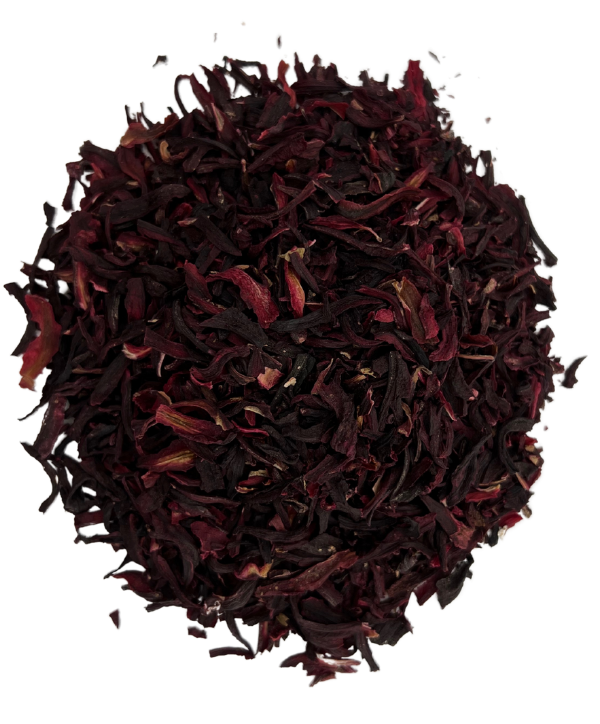What is Hibiscus ?
Hibiscus, also known as Hibiscus sabdariffa or roselle, is a type of flowering plant native to India and Malaysia (
There are hundreds of types of hibiscus, including herbs, shrubs, and trees. The most commonly cultivated type is Hibiscus sabdariffa, a shrub marked by red stems and wide yellow flowers that turn pink and red (
Hibiscus grows in tropical and subtropical regions, including China, Thailand, Sudan, Nigeria, and Mexico. The flowers, seeds, leaves, and stems are all used for culinary, cosmetic, and medicinal preparations (
One of the most common preparations is hibiscus tea, a deep red herbal tea made from the flowers. It’s enjoyed hot or cold. Also known as sour tea, it has a tart flavor similar to cranberries.
In addition to teas, you can purchase hibiscus powders, capsules, and liquid extracts. Depending on the product, these can be made from different parts of the plant.
In folk and traditional medicines, hibiscus is used to lower blood pressure, stimulate diuretic effects, reduce high cholesterol, and more. The abundance of bioactive compounds in hibiscus is thought to contribute to its health benefits (
Antidiabetic and anticancer effects are among the purported benefits of hibiscus. Hibiscus preparations may also help lower blood pressure, protect the liver, and decrease fasting blood sugar.
Blood pressure
Several human trials have found that hibiscus beverages and supplements can decrease blood pressure (
A study in 46 adults with high blood pressure found that drinking 2 cups (474 mL) of hibiscus tea daily for 1 month combined with lifestyle and dietary changes reduced blood pressure significantly more than lifestyle and diet changes alone (
Other studies have found that hibiscus extracts may be as effective as pharmaceutical medications for high blood pressure. However, more research is needed (
Obesity
Hibiscus may help with weight loss and protect against obesity (
Research in animals suggests that hibiscus extracts may help prevent fat cells from accumulating. This could prevent complications sometimes seen with obesity, such as fatty liver and insulin resistance (
The fiber in certain preparations of hibiscus may also help prevent weight gain (18).
One study in rats found that adding ground hibiscus to animal feed reduced body weight, body fat, and pro-inflammatory compounds in fat tissue (18).
Still, studies in humans are necessary to better understand the potential anti-obesity effects of hibiscus.
Metabolic syndrome
Metabolic syndrome is a cluster of risk factors, including high blood sugar, high blood triglycerides, low HDL (good) cholesterol levels, and excess body fat. These factors can increase the risk of developing conditions such as heart disease and diabetes (
Promisingly, hibiscus may help treat metabolic syndrome.
A small study in 16 older women with metabolic syndrome found that drinking hibiscus tea twice daily for 21 days significantly reduced blood pressure, blood triglycerides, and fasting blood sugar compared with placebo (
In another study in 40 adults with metabolic syndrome, those who took hibiscus powder once daily for 4 weeks experienced significant decreases in blood triglycerides and systolic blood pressure compared with a placebo group (
Overall, hibiscus may help manage aspects of metabolic syndrome, especially blood sugar issues, although more research is needed (
Liver damage
Hibiscus may also protect your liver from damage associated with obesity, diabetes, or certain medications.
The colorful anthocyanins in hibiscus have been found to increase liver antioxidant enzymes, protect against oxidative stress, and prevent liver fat accumulation in rats with diabetes and obesity (23,
Other animal studies suggest that hibiscus extracts can protect against liver toxicity associated with chemotherapy drugs (
Keep in mind, though, that research on the effects of hibiscus on the liver in humans is limited. It remains unclear whether hibiscus has the same benefits in people as it does in animals.
Cancer
The antioxidant compounds in hibiscus may also have anticancer properties.
Test-tube studies suggest hibiscus extract may inhibit enzymes involved in prostate cancer development and trigger the death of breast cancer and melanoma cells (
Hibiscus may even enhance the effect of chemotherapy treatments on breast cancer cells (
However, research on the role of hibiscus in cancer treatment is preliminary and mostly limited to test-tube studies. Large-scale human trials are needed to learn more.
https://www.healthline.com/health/all-you-need-to-know-hibiscus#benefits
How to prepare Hibiscus ?
- Pick fresh hibiscus flowers. Pull all the petals from the flowers. …
- Boil the kettle and add boiling water over the fresh petals. …
- Remove all the yellow petals. …
- You can drink the tea hot or cold. …
- Add freshly squeezed lemon and see how the colour magically changes to a beautiful pink!
- Drink and enjoy!
1This product has not been evaluated by the Food and Drug Administration.” This product is not intended to cure or treat any disease. “
Signature Tea is a Luxury tea brand that offers the finest experence with consuming tea. While our signature blends have amazing benefits, it is not a food substitute. For maximum health benefits it should be used along side a healthy balanced diet. People who are iron deficiant should not drink tea if you have low iron levels, excessive tea intake may exacerbate your condition.

Tea Subscriptions
Signature Luxury Teas offers you three exclusive Memberships. Receive a monthly tea party in the comfort of your home! Fresh, Loose-leaf Teas for Your Health & Wellness!
